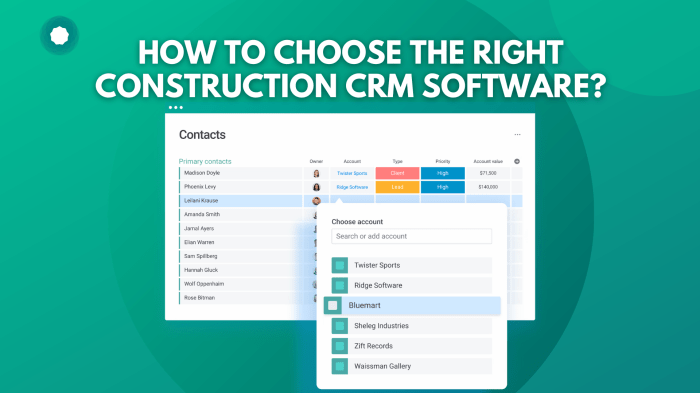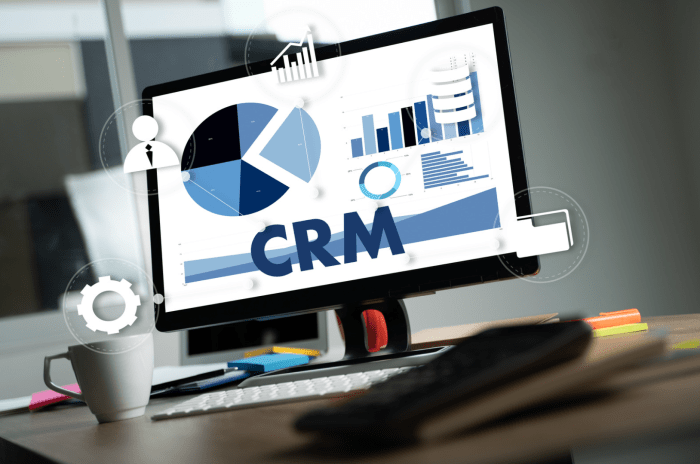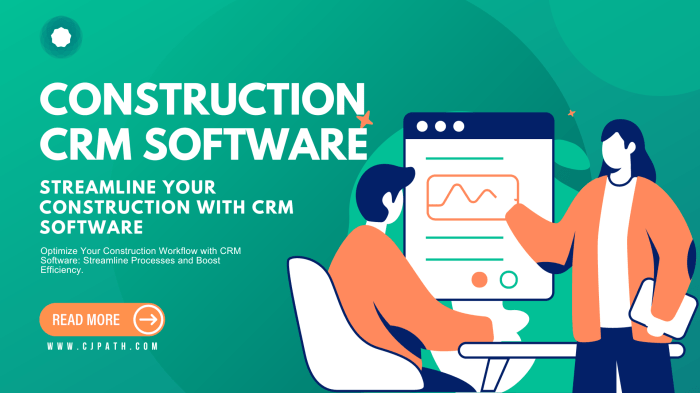Crm software for contractors – In the competitive landscape of the contracting industry, efficiency and organization are paramount. Managing leads, projects, client communication, and team collaboration can quickly become overwhelming without the right tools. This is where Customer Relationship Management (CRM) software steps in, offering a centralized hub to streamline operations and boost profitability. This comprehensive guide delves into the world of CRM software specifically tailored for contractors, exploring its benefits, key features, selection process, and frequently asked questions.
Understanding the Needs of Contractors: Why CRM is Essential
Contractors face unique challenges. Juggling multiple projects simultaneously, managing diverse teams, tracking expenses, and maintaining strong client relationships demand exceptional organizational skills. Traditional methods like spreadsheets and email often prove insufficient, leading to missed deadlines, miscommunication, and ultimately, lost revenue. A robust CRM system addresses these challenges by:
- Centralized Information: Consolidating all client, project, and communication data in one easily accessible location.
- Improved Lead Management: Tracking leads from initial contact to project completion, ensuring no opportunity slips through the cracks.
- Enhanced Communication: Facilitating seamless communication with clients, subcontractors, and team members through integrated messaging and task management.
- Streamlined Project Management: Tracking project timelines, budgets, and milestones, ensuring projects stay on track and within budget.
- Increased Efficiency: Automating repetitive tasks, freeing up valuable time for strategic decision-making and client interaction.
- Better Reporting and Analytics: Gaining insights into business performance, identifying areas for improvement, and making data-driven decisions.
Key Features of CRM Software for Contractors
While all CRM systems offer core functionalities, contractors should look for specific features that address their industry’s unique requirements. These include:

Source: cjpath.com
Project Management Capabilities
Effective project management is crucial for contractors. Look for CRM systems with features like:
- Task Management: Assigning, tracking, and managing tasks related to each project.
- Timeline Visualization: Gantt charts or similar tools to visualize project timelines and dependencies.
- Budget Tracking: Monitoring project expenses against budgets to prevent overspending.
- Document Management: Storing and sharing project-related documents securely.
- Progress Reporting: Generating regular reports on project progress for clients and internal stakeholders.
Client Relationship Management
Maintaining strong client relationships is key to repeat business. Essential CRM features for this include:
- Contact Management: Storing detailed client information, including contact details, communication history, and project history.
- Communication Tools: Integrated email, phone, and messaging capabilities for seamless communication.
- Client Portals: Providing clients with secure access to project information, documents, and communication.
- Customer Service Ticketing: Efficiently managing and resolving client inquiries and issues.
Team Collaboration Tools, Crm software for contractors
Effective teamwork is essential for successful project completion. Look for CRM systems with:

Source: centerpointconnect.com
- Team Collaboration Features: Shared calendars, task assignments, and communication channels.
- Role-Based Access Control: Restricting access to sensitive information based on user roles.
- Real-time Updates: Keeping all team members informed of project progress and changes.
Reporting and Analytics
Data-driven decision-making is crucial for growth. Consider CRM systems with:
- Customizable Reports: Generating reports on key performance indicators (KPIs) such as project profitability, client satisfaction, and team productivity.
- Data Visualization: Presenting data in clear and easy-to-understand charts and graphs.
- Integration with Accounting Software: Seamlessly integrating with accounting software for accurate financial reporting.
Choosing the Right CRM Software for Your Contracting Business
Selecting the right CRM system requires careful consideration of your specific needs and budget. Factors to consider include:
- Size of your business: Small businesses may need simpler systems, while larger businesses may require more robust solutions.
- Number of users: Ensure the system can accommodate your current and future team size.
- Budget: CRM software comes in various pricing tiers, from free options to enterprise-level solutions.
- Integration capabilities: Consider whether the system integrates with your existing software, such as accounting software and project management tools.
- Ease of use: Choose a system that is intuitive and easy for your team to learn and use.
- Customer support: Ensure the vendor provides adequate customer support and training.
Popular CRM Software Options for Contractors
Several CRM platforms cater specifically to the needs of contractors. Research and compare options like:
- Zoho CRM: Offers a wide range of features at various price points.
- HubSpot CRM: A popular choice known for its user-friendly interface and marketing automation capabilities.
- Salesforce: A powerful and scalable platform suitable for larger contracting businesses.
- Freshworks CRM: A comprehensive solution with strong customer support.
- JobNimbus: Specifically designed for field service businesses and contractors.
Remember to leverage free trials or demos to test the software before committing to a purchase.
Frequently Asked Questions (FAQ)
- Q: How much does CRM software for contractors cost? A: Costs vary widely depending on the features, number of users, and vendor. Expect to find options ranging from free plans with limited features to enterprise-level solutions costing several hundred dollars per month.
- Q: Is CRM software difficult to learn? A: Many modern CRM systems are designed with user-friendliness in mind. However, the learning curve can vary depending on the complexity of the software and your team’s technical skills. Look for systems with good documentation and customer support.
- Q: Can CRM software integrate with other business tools? A: Yes, many CRM systems offer integration with other business tools, such as accounting software, project management tools, and marketing automation platforms. This integration is crucial for streamlining workflows and improving efficiency.
- Q: How long does it take to implement CRM software? A: Implementation time varies depending on the complexity of the system and the size of your business. It can range from a few weeks to several months. Proper planning and training are crucial for a successful implementation.
- Q: What are the benefits of using a CRM for my contracting business? A: The benefits include improved lead management, enhanced client communication, streamlined project management, increased efficiency, better reporting and analytics, and ultimately, increased profitability.
Conclusion: Embrace the Power of CRM for Contracting Success
Implementing a CRM system is a strategic investment that can significantly improve the efficiency and profitability of your contracting business. By centralizing information, streamlining workflows, and enhancing communication, a well-chosen CRM empowers you to manage projects more effectively, nurture client relationships, and achieve sustainable growth. Take the time to research different options, consider your specific needs, and choose a system that empowers your team to work smarter, not harder.
References
Call to Action
Ready to take your contracting business to the next level? Explore the CRM options mentioned above and schedule a demo today to see how a CRM can transform your operations and boost your bottom line!
Questions Often Asked: Crm Software For Contractors
What are the key features to look for in CRM software for contractors?

Source: cjpath.com
Essential features include contact management, project management capabilities (task assignment, timelines, progress tracking), reporting and analytics, and ideally, integration with accounting and scheduling software.
How much does CRM software for contractors typically cost?
Pricing varies widely depending on the features, number of users, and vendor. Expect a range from affordable monthly subscriptions to more substantial enterprise-level solutions.
Is CRM software difficult to learn and use?
Most modern CRM systems are designed with user-friendliness in mind. Many offer intuitive interfaces and training resources to ease the transition. The learning curve varies depending on the complexity of the chosen software and the users’ prior experience with similar systems.
Can CRM software integrate with my existing business tools?
Many CRM solutions offer integrations with popular accounting, scheduling, and other business software. Check the specific software’s capabilities to ensure compatibility with your existing tech stack.
